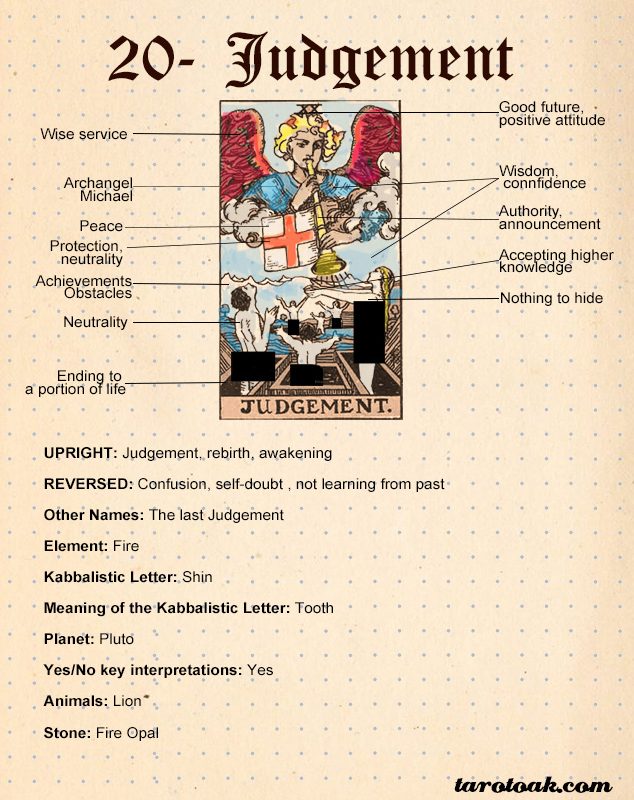When exploring the world of tarot, few cards evoke as much intrigue as the Judgment card. This card, nestled within the Major Arcana, represents a pivotal intersection of self-reflection, renewal, and the reckoning of past actions. But what does it truly mean when this card appears in a spread? How might it influence the querent’s journey forward? In delving into the depths of the Judgment card’s meaning, we uncover layers of significance that extend beyond a mere yes or no answer.
The Judgment card often showcases a scene of resurrection—a powerful metaphor for rebirth and transformation. Traditionally depicted with an angel sounding a horn, it calls forth the spirits of the deceased from their graves. This imagery invites one to ponder: What aspects of their life need a revival? What dreams and aspirations have languished in obscurity, waiting for the light of day? It is within this intricate symbolism that the true essence of the Judgment card begins to unfurl.
In a reading, the Judgment card can serve as a clarion call—a reminder to evaluate personal history. It poses the question: Are you prepared to confront the choices you have made and the consequences they have wrought? As the querent engages in this process, they may experience a surge of nostalgia, reflecting on the past and recognizing the ways it has shaped their present circumstances. This introspective moment can illuminate hidden truths and reveal the wisdom that comes from experience.
The Judgment card also signifies a moment of awakening. This awakening can manifest as an epiphany, bringing clarity to previously murky situations. For instance, one might suddenly realize that a toxic relationship has been stifling their growth, or that an unfulfilled ambition is rooted in fear of failure. With the Judgment card’s presence, there is a nudge toward accountability—an invitation to embrace the results of one’s actions. This is where the challenge arises: To heed the call, one must be willing to let go of self-deception and embrace the responsibility that comes with growth.
Moreover, this card invites querents to consider their larger life purpose. Are they living authentically? Are they contributing positively to the world around them? The Judgment card encourages self-assessment, pushing individuals to think critically about their choices and their alignment with their values. This self-inquiry often leads to significant breakthroughs, prompting shifts in perspective that can steer a life in a dramatically new direction.
The card’s positive connotations are worth mentioning. It suggests that forgiveness, both of oneself and others, is instrumental in the journey toward deeper understanding. Forgiving past missteps allows individuals to liberate themselves from guilt and regret, ultimately paving the way for renewal. The Judgment card emphasizes that transformation doesn’t simply arise from external circumstances, but often from profound internal changes. It is the act of forgiving and releasing old wounds that leads to resurrection.
In contrast, when the Judgment card appears reversed in a reading, its implications can shift substantially. It signifies a stagnation or an unwillingness to confront the truths of one’s past. The querent may be resisting change, clinging to familiarity instead of embracing growth. This state of denial can manifest as emotional paralysis, hindering one’s progress on the path to enlightenment. The challenge here is to break free from the chains of complacency, to recognize the possibilities that lie on the other side of self-denial.
At its core, the Judgment card embodies the concept of ultimate reckoning. It invites profound vulnerability—daring those who encounter it to embrace an honest appraisal of their life story. This process fosters a deep connection to intuition, illuminating the inner voice that can guide one through challenging decisions. In this way, the card stands as a testament to the power of choices and their implications; each decision is a thread woven into the intricate tapestry of one’s life.
The card’s influence extends beyond the individual, impacting relationships and the wider community. By grappling with personal accountability, one cultivates a sense of empathy and responsibility toward others. This communal aspect of the Judgment card incites questions about how personal decisions ripple out to affect family, friends, and society at large. Are you living in a way that not only serves your aspirations but also uplifts those around you?
In conclusion, the Judgment card is a profound harbinger of reflection, accountability, and transformation. It urges individuals to confront their past with courage and honesty, promising renewal on the other side. Embracing the challenges that accompany self-assessment leads to exhilarating growth. Whether upright or reversed, the Judgment card offers valuable insights about one’s journey and the potential for rebirth in every facet of life. Its presence serves as a reminder that the power for change resides within, just waiting to be unleashed.







Leave a Comment